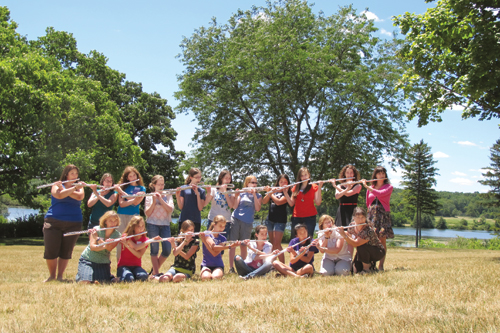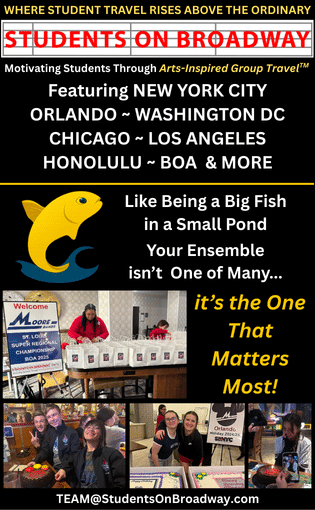
It is becoming ever more difficult to recruit talented college students as fewer students choose music as a profession in this unstable economy. In most states there are many strong programs to choose from, but the story is different in rural areas. Since there are fewer private flute teachers and professional musicians, a one-day flute festival is a great way to connect with flute students in your region. A flute festival not only benefits students but is an excellent recruiting tool for a college music program. A flute festival also gives local flute teachers an opportunity to promote their studios, which helps keep local flute playing alive and well. It may also lead them to send students to study in your program.
Location
Wyoming is rather mountainous and also the least populated state in the country. As a result, I move the location of my Flute Day every year to accommodate different communities and promote my school, the University of Wyoming. I am continually amazed and humbled by the huge outpouring of support I receive from local band directors, flute teachers, and music stores. Creating a portable Flute Day is a little more work, but well worth it. It gives the opportunity to reach out to students I would not otherwise see because travel to Laramie is too difficult for many. For those more centrally located with easier travel options, your home turf may work better. It has the added advantage of bringing prospective students to the campus.
The Basics
The elements of a successful event should include interesting programming for a wide range of ability levels, as many participants as possible, and the involvement of other flute teachers. I have devised a checklist over the years that should work for most small flute festivals.
1. Select a Date
Consult with band directors and private flute teachers to select a date that avoids potential conflicts with athletic and musical events. In Wyoming the weather is more conducive for travel in the early fall or late spring, so choosing a date with the weather in mind may be important in some areas of the country.
2. Engage a Venue
The event should have a stage for performances, a band room or other large room for flute choir rehearsals and to be used as a staging area before concerts, and access to a front lobby area or hallway near the band room for a registration table. These facilities are usually available at a university, community college, high school, or junior high school. Choose a location where the people in charge of the venue are excited about hosting the event. They can be of great assistance as you organize the specifics of the Flute Day. Ideally, they will help with communication to other music teachers, music stores, and performers in the community who can help promote the event.
3. Arrange for Equipment
I use a large table and chairs for registration, another table for lunch and reception food, and enough music stands to accommodate a flute choir. Your students may serve as stagehands for the rehearsals and the concerts.
4. Create a Flier and Pre-registration Materials
Be sure to include the day’s schedule on both your Flute Day flier and pre-registration materials. A good flier highlights the day’s events, includes short bios of the presenters, and collects information about participants. Be sure to ask participants when they will graduate from high school or college as this will help in future recruiting endeavors. You may wish to include information about your school’s music program and especially your flute studio’s activities. Include contact information for any questions a student might have.
Even if there is no charge for the event, make pre-registration a requirement. People who pre-register and order lunch are people who show up on the day ready to participate. You may distribute forms via an email to band directors (get on your state’s Music Educator’s list), private teachers, music stores, and former Flute Day participants. Your university can post the information on the department website.
5. Plan the Day
A flute day may feature a guest artist or the artistic talent from around your area or state. My Flute Day model keeps expenses at a minimum, so I do not use guest artists who charge a performance fee.
I prefer to highlight local teachers’ talents; however, there is no doubt that a recognized name on a poster attracts more participants. If you choose to hire a guest artist, inquire about funding from your department or school, as well as at the state level. Many states have arts funds that support educational outreach activities. Be sure to apply early. Read winning proposals from previous year’s applications if possible before completing your grant application. A special theme or area of interest involving another discipline may give you an edge in the competition. The Mockingbird Foundation (mbird.org) finances educational pursuits and has one of the easiest applications in the business.
If you hire a guest artist, there is a fee for teaching and performing, and you will have to provide for transportation and housing. Many flutists have special underwriting arrangements with flute manufacturers, so you may only be responsible for a small amount of the total cost. Some guest artists prefer staying with host families rather than at a hotel. Communicate with the artist about these options well in advance. Ask your department head if there is funding available.
Several months before the Flute Day, contact flute professors and private teachers to coordinate a flute choir concert and a teachers’ recital. Ask that each performer bring an accompanist or keep everything unaccompanied.
6. Keep it Simple
The day should be fun and stimulating and leave students wanting a little bit more. Students should not leave exhausted or check their watches during the afternoon concerts. Allow local teachers a time to shine (professionals’ recital, morning warm-up, conducting individual pieces on the flute choir concert). Make sure you have plenty of time to meet with students and parents (masterclass, recital, and even the registration table). Give students opportunities to be active participants in masterclasses and include everyone in the flute choir concert. An efficient schedule keeps you from collapsing in exhaustion, and requires fewer resources from the hosting facility.

7. Find Sponsors
Invite local music stores to participate. They may underwrite the guest artist, print and distribute fliers, exhibit music and accessories, or offer repair services. One music store donated pizza and drinks for the lunch. A reputable repair person in the area might be willing to attend and make small repairs the day of the event, particularly if you include that person’s contact information in your advertising and encourage students to call ahead and schedule appointments. Other local merchants may be willing to help as well. For example, a bakery might supply cupcakes and cookies for the after-concert reception.
Small towns tend to be supportive of events big and small; local hotels may be willing to offer a discounted rate for families coming from farther away. Just pick up the phone and ask. Local band directors and private music teachers can suggest friendly businesses as a starting point.
8. Have a Registration Table
The registration table is an important tool in the success of the event. If a flutist has not pre-registered, then have him fill the out the registration materials. Distribute name tags listing participants’ name, school, and home address.
9. Plan the Flute Choir Concert
Some students may be satisfied sitting passively all day listening to information, but nothing creates the sense of a big event like a concert. It is possible to find flute choir music to suit a diverse set of abilities. It may be helpful to have a short roster of pieces that rotate on a bi-annual basis. Require students to register at least one month before the event so that you can distribute flute choir music in advance. Rotate parts in each folder so that even less experienced flutists play first and second on a piece. A flute choir allows students from various schools to mingle and older students to mentor younger students.
10. After the Event
A few days after the event, send a thank you note to everyone who helped. Letters to potential students should be printed on university stationery or come from your official school email. Include your contact information and a link to your page on your school’s website. The registration list may be used to send students and private flute teacher’s information about future concert events, masterclasses, honor bands, and audition dates for the university music program. This will help you create a relationship with high school flutists across the state.
After hosting my first Wyoming Flute Day, I was invited to three other communities who wanted to host future Flute Days. I met students whose names I had seen in the All-State roster for years but had never met on campus. I began to feel a stronger sense of community among the flute teachers in the state,
many of whom drove over 100 miles to attend and participate in the event. The result of this stronger sense of community in rural Wyoming is that teachers are able to do more to promote their private studios and a larger number of flute students are taking lessons. The overall playing level is improving in All-State auditions and music festivals, and I am seeing a larger number of flute students auditioning for our programs at University of Wyoming.
On a personal level, strengthening my ties with private flute teachers around the state has been incredibly rewarding and has made all of us feel less isolated as we strive to grow as musicians and teachers. Running a flute festival is not just good for the recruiting business; it is good for the community.






